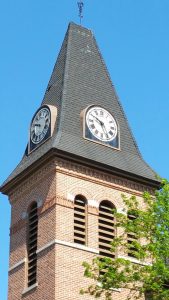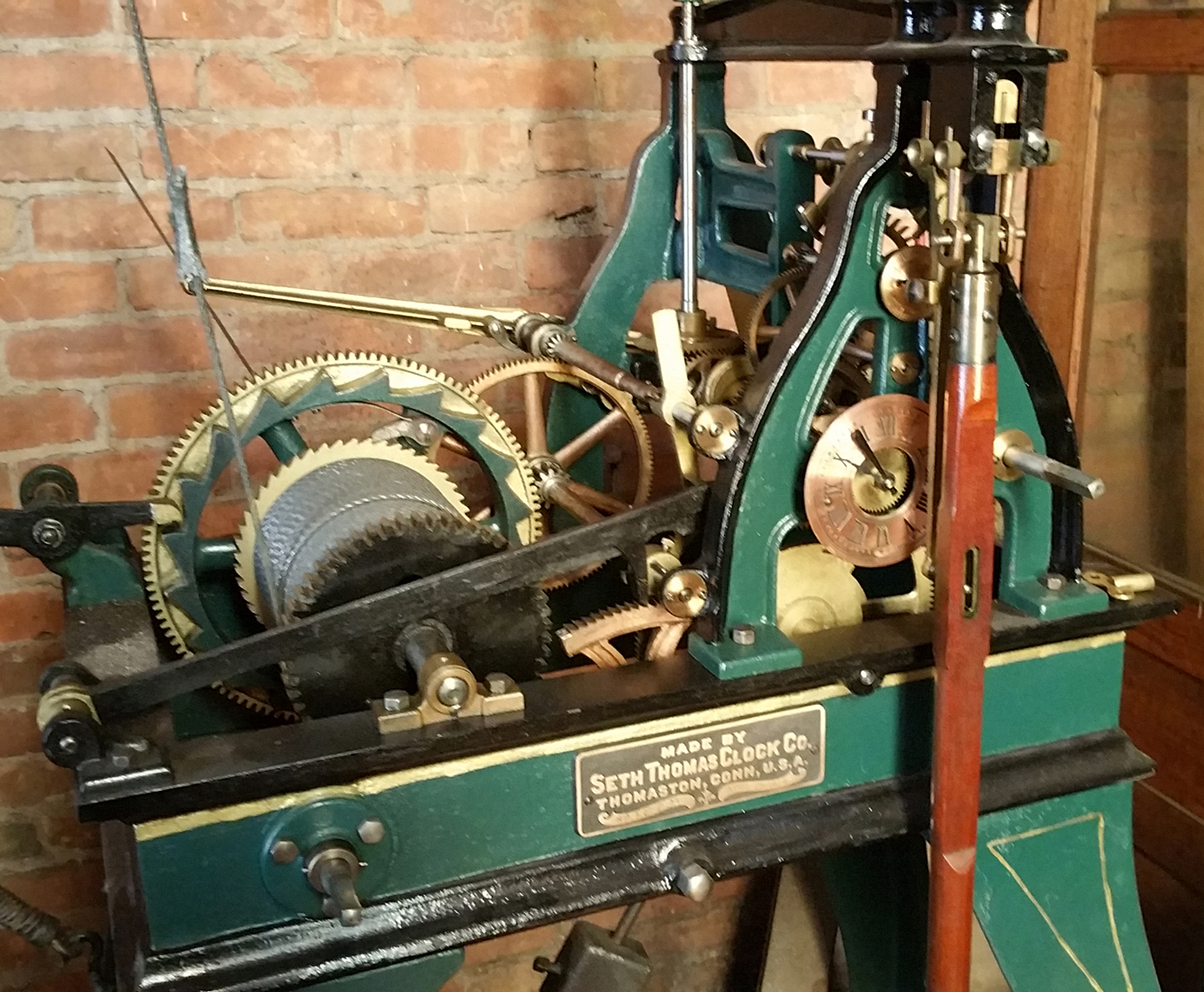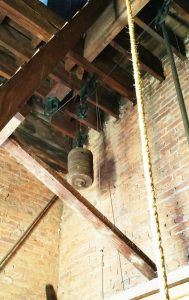The time and the chime to be restored in Brockport’s tower clock

There is a ghostly presence to the silenced Seth Thomas Tower Clock on the Brockport United Methodist Church on Main Street. Over a year ago, it stopped dead, muted with no more chiming on the hour. “It kept perfect time for 90 years before requiring minor repairs in 2004,” Bill Andrews said. “After running another 12 years, it has stopped completely and requires extensive work.” Andrews is Deputy Mayor of Brockport and Village Historian Emeritus.
To revive the clock and have it again marking the time of village life, the Brockport Lions Club has committed to raising the $21,500 cost of repair by the Essence of Time company in Lockport. Estimated to take place at the end of July, all parts of the tower clock will be removed and taken to the Essence of Time shop in Lockport for many months of work.
At the village crossroads of Main and Erie Streets, the church’s lofty tower holds some fascinating history. And, it hides the ingenious mechanism that for a century ticked off the seconds and tolled the hours of each day.
A contribution by the Daughters of the American Revolution
It was the Monroe Chapter of the Daughters of the American Revolution (D.A.R.) who contributed the clock to the Village of Brockport. On a Tuesday morning in May, 1914, ladies of the “clock committee” were there to inaugurate it, setting the pendulum swinging and waiting for the first hourly strike at 11 a.m., according to an article in the Brockport Republic, May 21, 1914. The article continues:
The (D.A.R.) party remained in the belfry until the clock struck 11, and passed their judgement upon the strength of the stroke which it is the desire of the clock’s donors to have neither too loud to disturb those living very near, nor too soft to be well heard at a reasonable distance. The ‘strike’ as now regulated seems to reach this happy medium.
It is difficult to imagine how the ladies stood next to a loud striking bell and determined the range of the sound far and near. But, credit them for the contribution, their courage, and for considering the hearing comfort of the citizens.
The clock was donated in memory of Revolutionary War soldiers who are buried in the vicinity of Brockport. A bronze plaque appears on the outside wall of the clock tower facing Main Street naming 30 Revolutionary War soldiers and also honors those unknown. The presentation of the town clock and the unveiling of the memorial tablet took place June 20, 1914.
“The dedication was a signature event in the history of the village, attracting a crowd of 1,500,” Bill Andrews said, “and was graced by the presence of many dignitaries who delivered long addresses.”
A magical mechanism hidden from public view
The entrance to the first level of the clock tower is in back of the church sanctuary behind the choir loft. Stepping inside, the view above is cavernous. Huge rafters support the belfry which holds the bell and the shafts and gears that operate the steeple’s four clocks. A crude ladder ascends about 20 feet to the trap door into the belfry. (See photos).
In contrast to the rugged overhead structure, the ground floor holds the intricate clockworks mechanism with shining brass gears, rods, and levers mounted on a cast iron stand. Housed in a wood-and-glass enclosure, a vertical shaft extends from the clockworks into the belfry to run the four steeple clocks.
The mechanics of the tower clock were described by the Brockport-Republic reporter (cited above) on the day the clock was started. He refers to the “expert mechanic, Mr. E. A. Albecker, of the Seth Thomas Company, the clock’s makers,” who had been at work for just eight days, “testing and installing its delicate machinery.” He makes these technical observations:
It was found necessary to install a half-ton weight for running the clock, which will require winding once a week from a point downstairs in the church tower. The ‘fall’ of the time weights of the clock is 10 feet 8 inches for eight days on one side, and on the ‘strike’ side 32 feet for eight days. The clock is to strike the hours only.
E.B. Elwell, in his December 30, 1954 letter in the Brockport Republic-Democrat, writes about being invited to watch the winding of the large clock:
On arriving at the base of the steeple, I was amazed at the size of the working parts. They occupy a space comparable to that of the family sharp freezer. The clock is operated by two ponderous weights. The one giving the action for striking the hour was about twice the size of the one operating the movement of the hands. The former also had to be raised twice as high as in the winding operation. It takes several minutes of exhausting labor to raise those weights to their extreme height. Formerly, the care of the clock was assigned to one of Brockport’s jewelers but now the utility men at the village building have taken charge.
The current “utility” man is Dave Moore, foreman in the Village Department of Public Works and a helpful resource for this story. For about 20 of his 30 years with DPW, he has raised the weights weekly. Keith Marshall, Brockport Lions Club President, has been doing it for the last couple of years. In the tower, he explained how a crank is used to lift both weights, each weight with different functions as Elwell described. The heavier weight is 800 pounds and the smaller weight 200 pounds (More detail in photos).
Memorializing soldiers’ sacrifice and Yankee ingenuity
The primary purpose of the tower clock is to honor the memory of Revolutionary War soldiers whose sacrifice ultimately brought us to this place in time, enjoying “life, liberty and the pursuit of happiness.”
But Yankee ingenuity itself is honored with each moment that has been ticked off by the clock since that first day in May, 1914. The ingenious mechanism was stopped, not by faulty design, but by “a buildup of grease and oil covering the clock movement and dial gearing,” according to the Essence of Time contract.
The hidden works in the tower are like our canal lift bridges, operating out of sight with original engineering for one and two centuries respectively. Impacting our village life daily, the concealed and constant movement of the tower clock and the lift bridges pay tribute to the mechanical masterminds that built America.
Dedicated to restoring the clock and remembering its significance
People past and present have commented on the significance of the tower clock in our village. E. B. Elwell, at the end of his 1954 article, observed: “As so often happens, we, the public, take our surroundings as a matter of fact and do not delve into how they came about, or seldom realize their true worth or significance. May we in the future see more than the time of day when we look at our village clock in the Methodist Church steeple!”
Sixty-three years into that future, Village Mayor Margay Blackman sees more than the time of day, saying:
A gift to the Village from the DAR in 1914 in memory of those who served in the Revolutionary War, it reaches back in memory to 1776. For more than a century it has marked the passage of time for Brockport villagers. We noticed when its hands were stilled and are grateful for this community effort by the Brockport Lions Club to restore it.
Brockport Lions Club President, Keith Marshall, notes that 2017 is the 100-year anniversary of Lions Club International and announces:
The Brockport Lions Club is celebrating and participating with a Centennial Community Legacy Project. There is no better legacy project than to repair our village clock that has been a focal point of our community since 1914. Lion Dave Moore and Lion John Carey are heading up this project. We look forward in working together with the Village of Brockport and the Brockport community in restoration of the tower clock so generations can enjoy it for years to come.
(Note: For documents and other supporting information, thanks to: Bill Andrews, Charlie Cowling, Norm Frisch, Kathy Goetz, Pastor Meg Moran, Leslie Morelli, and Dave Moore. Dave Moore represents the Village and the Lions Club in this project. D.H.)
Tower Clock Fund Raising
Brockport Lions Club
Legacy Project
Brockport Lions Club is sponsoring a community project to raise $21,500 to repair Brockport’s tower clock in the Brockport United Methodist Church.
To contribute, send your check payable to:
“Village of Brockport/Clock Fund”
49 State Street
Brockport, NY 14420




